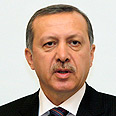

Hardly anyone disputes the assumption that the strategic alliance between Israel and Turkey has come to an end, at least for the time being. The political Left in Israel places the responsibility for this on the shoulders of its own government: Had we only pursued the peace process more vigorously, they claim, Turkey would still be on our side. Conservatives prefer to blame Turkey’s Prime Minister Recep Tayyip Erdogan, who undoubtedly prefers the company of Iran’s president Mahmoud Ahmadinejad to Israel’s Shimon Peres. Both sides have a point, but they miss the whole picture.
Two additional factors have driven Turkey to make a strategic U-turn. The first is the continuing decline of US power in the Middle East. The world’s only superpower has lost its deterrence and respect in the region to an extent that even Syria’s President Bashar al-Assad, who once clamored for the Americans’ favor, now dares to publicly poke fun at the US Administration without fearing any consequences. When US power diminishes, so decreases Israel’s standing as Washington’s most important ally.
The second decisive factor that has contributed to the radical change in Ankara’s foreign policy focus is the role the EU has played during the botched negotiations for Turkey’s accession to the Union.
Just a decade ago, being accepted into the prestigious club of rich Christian nations on the old continent was the highest aspiration of Turkey’s Kemalist elite. Kemal Ataturk, founding father of modern Turkey, had always wanted to reset his country’s focus from Asia to Europe, from East to West. The transition from the Arabic alphabet to the Latin one is just one visible example of this policy. Ataturk waged a cultural war against Islam in the public sphere, evidenced by the ban on veils.
This effort was strikingly similar to the developments that once took place inside one of Israel’s other crucial allies – Persia. Shah Reza Pahlevi waged a sometimes violent struggle against conservatives, even liquidating religious leaders, in the attempt to force modernity and a Western way of life down his people’s throat.
In contrast to what has been argued in the West, neither Turkey nor Iran have invented a modern Islam. The pro-Western, modernist forces in Turkey are not modern Muslims, they are anti-clerical or anti-religious. Their power rested on the army, who was eager to maintain close ties to the West, not least because of significant financial incentives that the US kept coming during the Cold War to assure the army’s loyalty as a bulwark against the Soviet Union.
In 2004, the EU commenced negotiations with Turkey about its accession. It was a long and winding road, on which the Europeans set off with a sizeable amount of naiveté, to put it mildly, or, to be more exact, hypocrisy. It was clear from the outset that Turkey not only had to incorporate 90.000 pages of Byzantine EU guidelines and legislation. In effect, in order to live to Europe’s expectations, the whole country had to fulfill the secularist Kemalist revolution, actually, change its very nature.
Out of sync with developments
Slowly, Europe eroded the power base of the Kemalist elites, the very part of the population that dreamt of joining the EU. All the while, it chose to ignore the fact that large swaths of Turkey’s population still fancy political Islam, loath secularism and all the West stands for, just like in Persia before the Islamic Revolution in 1979, which was perceived as a staunch ally of the West and Israel.
Europe demanded to limit the army’s influence and power, and in blind belief that its liberal democratic way is the only one to go, forced reforms on Turkey without concomitantly making sure that democratic structures and Western ideas take hold in the population. At the same time, Brussels disappointed its ardent supporters again and again: Predictable problems kept popping up during the accession talks, effectively bringing them to a complete standstill.
Europe demanded profound social changes, like the emancipation of women and freedom of speech, and insisted on concessions that humiliated Turkish national pride, as in the question of Cyprus. But at the same time, Brussels resisted on committing to any deadlines or guarantees on Turkey’s accession. From a Turkish point of view, they paid a high price and got little, if anything, in return. Whoever tried to concede to Europe’s demands, very soon appeared servile.
Without understanding the profound changes taking place in Turkey, Europe sided with Erdogan at the beginning of the Ergenekon affair. This ever expanding political scandal, which has resulted in the arrest of dozens of high-ranking officers and intellectuals of the opposition, is apparently being exploited by the Islamist regime to rid itself of the last pockets of resistance in the army and society at large. Liberal democratic Europeans simply could not conceive that, when there is a choice between an elected Islamist prime minister and unelected officers, opting for the Kemalist generals may be the lesser evil.
But they were out of sync with the developments in Turkey. They weakened the ability of pro-Western forces that are supportive of Israel to hang on to power and handed the keys to an Islamic faction that did not want to use its new-found power to ally itself with the West. When Europe halted negotiations, it left its supporters in Ankara empty-handed and convinced many skeptics that Turkey needs new strategic partners, turning east to the former “axis of evil”.
If Israel once seemed useful a golden handle to open the doors in the White House and Europe, it now became an obstacle in the emerging entente between Damascus, Ankara and Teheran.
Today, Israel bears the brunt of Turkey’s new strategic orientation, but it will surely not remain the only one. Jerusalem is only the first to pay the price not only for its own mistakes, but also for Europe’s follies.
Dr. Gil Yaron is an author and journalist specializing in Middle Eastern affairs















